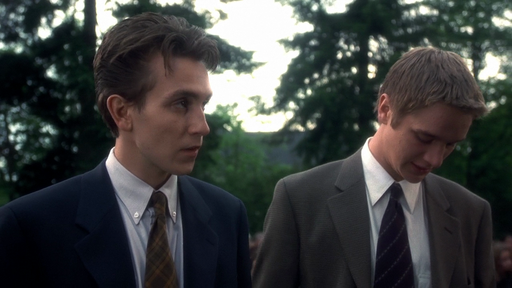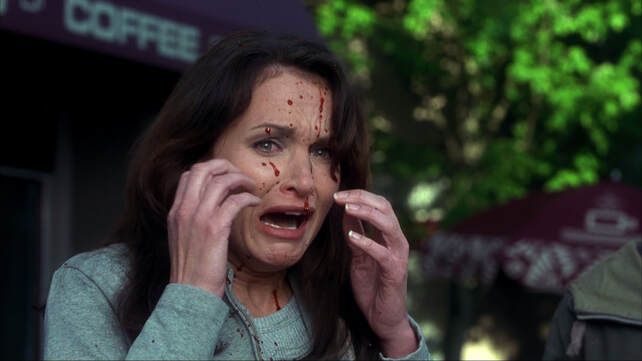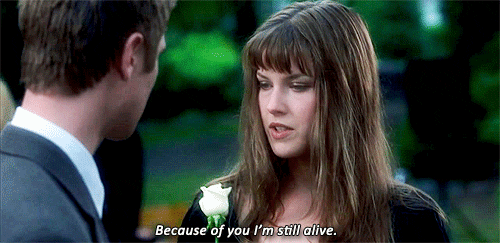 Leaving your house somedays you just have to wonder, “Will I exit the front door and innocently go about my day? Or will I open the door and accidently trigger a Rube Goldberg of death which will leave me eviscerated by a lawnmower?” Not an everyday kind of notion, but after Final Destination (created by Jeffrey Reddick and directed by James Wong), entered our lives 20 years ago, probably a thought process which appears far more than we’d like to think... ...The principle ideas and graphic imagery of the film trickled into our collective consciousness, and suddenly previously innocuous occurrences now make us envision elaborate deaths. Everyone who has seen a Final Destination film has that one death that impacted them (ex: driving behind a logging truck, using a tanning bed, etc) or, if you have ever marathoned the series, every harmless object in your life now becomes a possible death trap. Starting in 2000, the world experienced a new Final Destination every two or three years, but the franchise has remained silent for almost a decade. Promises for a reboot have been surfacing frequently over the last year, but are we still in a Final Destination era? Many Destination fans hold strong nostalgia for the movies but relying on the familiar plot of the series might not be enough in the search for a newer audience, so the creators of the reboot must take a different approach. The premise for the franchise remained consistent throughout the series (with a couple loopholes added in later installments) and followed a pretty predictable formula. Each film starts with a large tragedy which kills several people, but a last-minute clairvoyant vision allows for a handful of possible victims to escape death. For the rest of the film, the story follows the survivors as complex and gruesome deaths eliminate each of them. The overall theme of the films explain away all the coincidences by saying “no one can cheat death” and “Death has a design.” When looking at the movies as a “slasher” genre, Death plays the role of the killer and hunts down the youths one-by-one à la Jason Voorhees or Michael Myers. However, the plot goes beyond the average slasher tropes and explores ‘survivor’s guilt,’ earning Final Destination the label of a psychological horror. Instead of “Death” as the boogeyman, the minds of the characters serve as the actual antagonist. At the beginning of every film, a small group of people survive a tragedy and none of them understand ‘why’ or cannot accept the fact they survived while others died. The fear, remorse, and impending doom found in all five films serves as the killer because the series exists as the personified version of “survivor’s guilt.” The franchise’s weighted emphasis on loss carries it beyond simple psychological horror and into “misery horror”. Walking away from a tragedy physically unhurt, but knowing that same disaster killed a friend, sibling, teacher, or even complete stranger, weighs heavily on the survivors. In the first film, Tod (Chad Donella) cannot comprehend the death of his brother, Miss Lewton (Kristen Cloke) feels guilty about the loss of her students and co-worker, and even months after the events, the plane crash still consumes Alex’s (Devon Sawa) thoughts even while he vacations in France. Now almost ten years after Final Destinaion 5, our world experiences tragedies on a much larger and more frequent scale, making survivor’s guilt much more prominent and therefore less embraced as a form of horror. The movies rely heavily on dread and obsession, but how would a modern audience accept these feelings in a franchise? Feeling always on the edge of a deadly natural disaster, massive shooting, or world-wide pandemic gives everyone a higher chance of experiencing a tragedy. Therefore, looking at Final Destination as ‘Survivor’s Guilt: The Franchise’ will make a lot of movie viewers dismissive of the premise or even find the topic protest worthy. At the same time, among horror scholars, some people prefer to distance themselves from films viewed as hyper-specific/real world violence. While plenty of Destination fans still exist and will remain loyal to the franchise, we no longer live in a Final Destination era, so the filmmakers must develop beyond “survivor’s guilt” to draw in a new audience. The most recent news about the reboot shows franchise creator Jeffrey Riddick and producer Craig Perry might have already considered the possible repercussions of releasing the same-old Final Destination to a modern audience, as the story will supposedly focus on the first responders. Changing the focus of the film from naïve youths just beginning their lives to people who experience death on the regular will greatly alter the overall theme of the movie. So, hopefully the Final Destination era does not need to come to an end, just take a different approach and find a fresh ‘villain.’ By Amylou Ahava Like Amylou's writing? Leave her a tip here through Ko-fi!
0 Comments
Leave a Reply. |
Archives
March 2023
|


 RSS Feed
RSS Feed